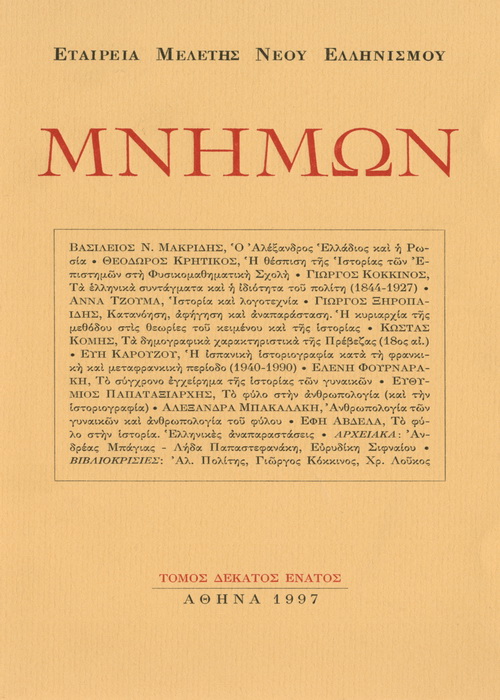ΚΑΤΑΝΟΗΣΗ, ΑΦΗΓΗΣΗ ΚΑΙ ΑΝΑΠΑΡΑΣΤΑΣΗ. Η ΚΥΡΙΑΡΧΙΑ ΤΗΣ ΜΕΘΟΔΟΥ ΣΤΙΣ ΘΕΩΡΙΕΣ ΤΟΥ ΚΕΙΜΕΝΟΥ ΚΑΙ ΤΗΣ ΙΣΤΟΡΙΑΣ
Abstract
The aim of this article is to demonstrate that the science of history —in much the same way as with all other human sciences— contains an irreducible hermeneutical dimension. This dimension precedes the nomological explanation which it not only comprises, but makes also possible. Since the explanatory procedures of human sciences are of the same kind with those of the natural sciences, the continuity of sciences is secured. However, to the extent that the hermeneutical understanding is one particular component, the discontinuity in the two regions of knowledge is unavoidable. The writer attempts also to establish the notion that the dimension of hermeneutical understanding is closely related to the narrative structure of historiography. According to the prevailing view, this structure undermines the representative and cognitive value of history. The argument against this view is that the representative value of historiography can be preserved if we can agree that historical narration does not give shape to the supposedly shapeless «content» of life, but on the contrary epitomizes in an innovative way the already narratively composed everyday experience and action.
Article Details
- How to Cite
-
ΞΗΡΟΠΑΪΔΗΣ Γ. (1997). ΚΑΤΑΝΟΗΣΗ, ΑΦΗΓΗΣΗ ΚΑΙ ΑΝΑΠΑΡΑΣΤΑΣΗ. Η ΚΥΡΙΑΡΧΙΑ ΤΗΣ ΜΕΘΟΔΟΥ ΣΤΙΣ ΘΕΩΡΙΕΣ ΤΟΥ ΚΕΙΜΕΝΟΥ ΚΑΙ ΤΗΣ ΙΣΤΟΡΙΑΣ. Mnimon, 19, 123–142. https://doi.org/10.12681/mnimon.291
- Issue
- Vol. 19 (1997)
- Section
- ARTICLES



